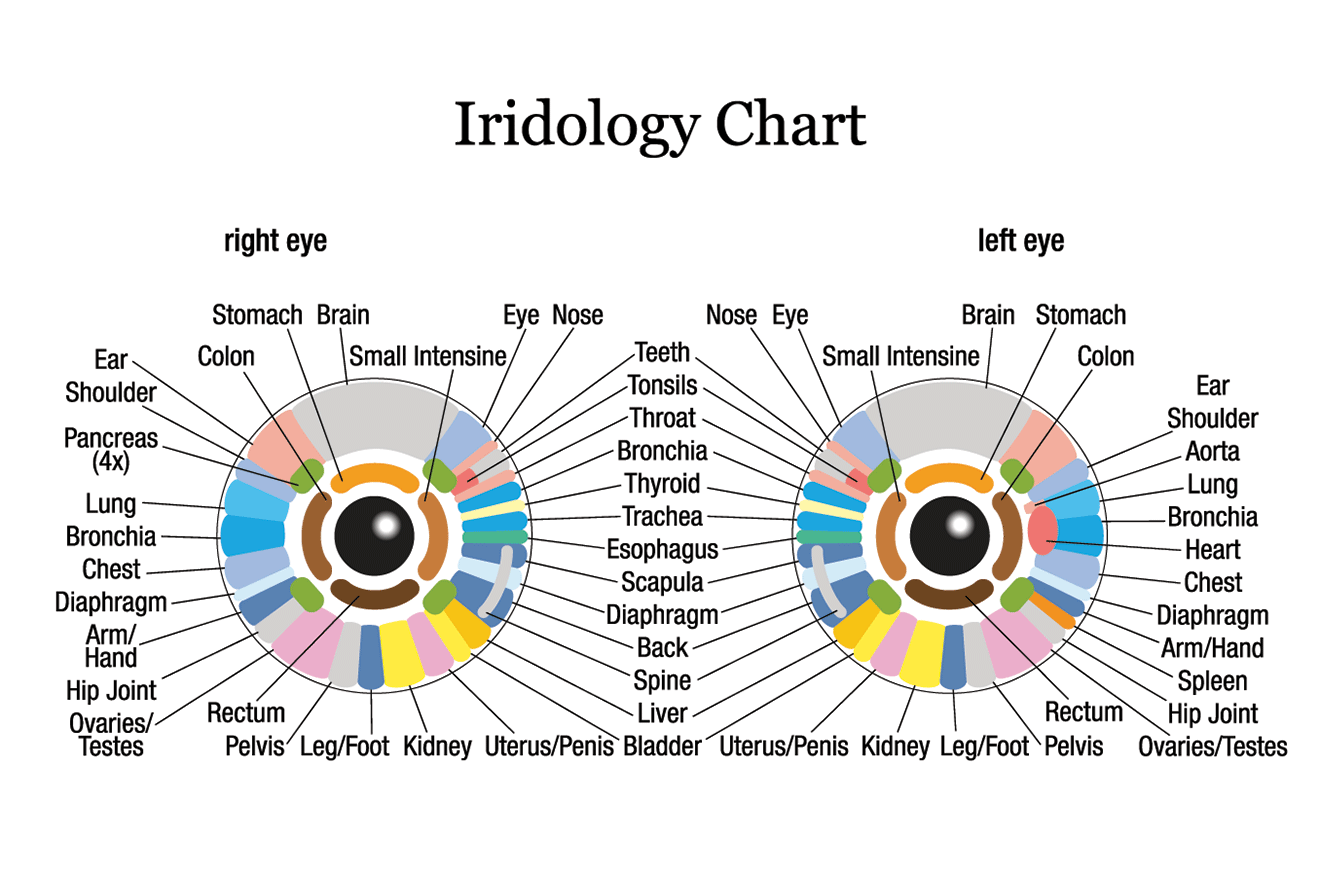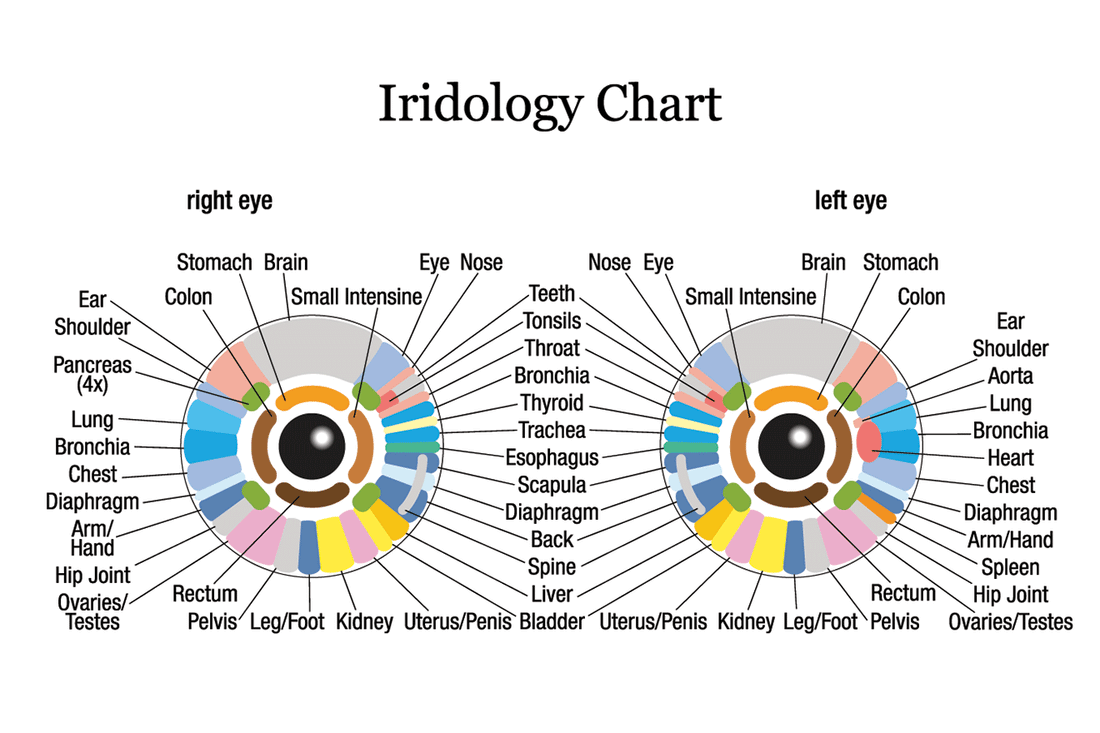Affiliate Disclaimer: Keep in mind that we may receive commissions when you click our links and make purchases. However, this does not impact our reviews and comparisons. We try our best to keep things fair and balanced, in order to help you make the best choice for you.
They say, “the eyes are the window to your soul” and there may be some truth to that. When I began my holistic journey I learned that you can read the iris and sclera to access what is going on with one's physical health. In my holistic training I learned how to read the sclera. It was amazing what I could see through the whites of your eyes. I was always fascinated with iridology and I finally had an opportunity to have my iris read by an iridologist. Iridology is the science of the study of the iris of the eye. It is used as an assessment tool. The irises reveal the genetic predispositions of the entire body.
Your eyes are your blueprint; no two irises are exactly alike – just like fingerprints. By looking at the fiber structure, color, markings, and pigmentations, we are able to discover your inherited strengths and weaknesses. These predispositions allow us to recognize acquired conditions, determine root causes and potentially correct them.

I had my exam with MyEyeRead with Jessica Halpern is our Certified Advanced Physical Iridologist and Holistic Health Coach with over 20 years of experience. A lot of things were confirmed and possibilities were revealed. You can view a video recap of my experience below. I also sat down and interviewed Jessica so we could get a better understanding of iridology and how it may be helpful to your life.
Want to get your eyes read? Click here and use coupon code “RAW” to get 10% off your exam
Nzingah :
Hi Jessica, It was exciting to have my eyes read, and I'm excited about doing this interview with you because I know people will have a lot of questions and I thought it'd be really good to have this interview with you. So, my first question is, what is iridology?
Jessica:
Well, it's science and art. I like to call it the art of reading the eyes, analyzing the eyes . So through the eyes we can see inherent individual predispositions as well as aspects of personality, because 80% of physical issues are usually emotional. The color, and the pattern of your eyes is a reflection of your unique genetic inheritance from about three generations back. We can see things before they come to fruition, and that's the best part of it because we can work on prevention. So I don't know if you know, but the eyes and the are one of the most complex besides the brain structures in the human body.
Nzingah :
Really.
Jessica:
So with the eye, there's a reflex connection to every organ and tissue in the body, by way of the nervous system. So through the optic nerves, they're attached to the eye from visual information sent to the brain. And at the same time, information coming back to the eyes from the brain about the state of all the organs and tissues in your body comes up through the spinal cord, the nervous system.
Nzingah :
Got it.
Jessica:
So we can see everything going on. It really is pretty cool how all the nerves are connected. So it's kind of like your, your brain is the computer in a way, computer program, and your eyes are your monitor. I'm not very tech savvy, but I think that's how it works.
Nzingah :
So how did iridology come into fruition? How was it birthed? What's its origin story?
Jessica:
Okay. Well, actually it stays back as far as ancient Babylon, and I don't know the exact date, but, and so the story goes that there was this doctor in Hungary, He had found an owl that was on the ground, and the owl had a broken leg. He saw a mark in the eye of the owl. There was a black line. Then he nursed the owl back to health and took care of this owl until he was better. He then noticed that that black line wasn't there anymore. Now this is kind of really folklore, but that's the story that most people know. Okay. But there was an ophthalmologist 1813, and he wrote a book called Textbook of Eye Disease. He wrote that everything that affects the organism of an individual, this is a quote, cannot remain without effect on the eye and vice versa. Then iridology in America was brought here by Bernard Jensen. I don't know the exact date, but it was in the 20th century, I think. He is known as the father of American iridology.
Nzingah :
Okay.
Jessica:
However we do things, we learned differently now. So like what he brought, it was a wonderful beginning, and he was wonderful bringing everything, but now we've learned so much more. So now we know that the eyes don't really change their structure. What you were born with is what you were born with, unless there's, God forbid, an accident and you have something happen to your eyes, you may acquire more pigment, but your structure is as individual as your fingerprint, actually even more accurate. And no two eyes are the same, not even in one person.
Nzingah :
How and why did you become an iridologist?
Jessica:
Well, I had my own health issues for many years. I was on a journey to get myself better when the doctors weren't helping me. I decided I had to take things into my own hands. I had tried everything. I was at a farmer's market one day and somebody overheard me speaking with a friend and recommended an iridologist to me and an herbalist. At the time, I had never heard of that before. And I was like, wow, that sounds pretty, pretty cool. You know, I might as well, what do I got to lose? So I made an appointment and he looked in my eyes, took photos, and some things were accurate and some not so much. But I did learn. I just was so fascinated by it. I realized you could see pretty much your genetics in your eye, what you have inherited. So , it was just mind blowing, you know? I just couldn't get enough of it after I started doing my own healing. I said, “I wanna learn more.” I wanted to know more. I couldn't get enough. And so that's what happened. I took many courses because each one is different. I knew I wanted to know everything. We can't possibly know everything, but I certainly wanted to know as much as I can so I can help people in the best way possible.
Nzingah :
Got it. So can you speak on what an iridologist sees through the iris versus the sclera?
Jessica:
Okay, so the iris is your genetic blueprint. So like I said, it goes back three generations. When I look at the iris I look at the color, structure, and what we call the diaphysis, the diaphysis can be acquired or inherent depends. Some are acquired, some are inherent, but I usually know which is which. Through those things, I can basically see the overall view of the health of the person and what possibly can come or not. It's all in our own hands. So we have the ability to turn on or turn off whatever it is. The sclera on the other hand is what we call dynamic. So the sclera is one of the most reactive parts of the eye. It can change, it can get brightened up. So there are some markings that are more transient and they can go away, the lighter ones. But then there were some that became constitutional. They've been there for a while, so like a heavy marking in the sclera, it may lighten up, but most likely won't disappear completely. However, the sclera gives me a more accurate picture of what's going on in the present.
Or what is coming. So there will be a marking, maybe that will be showing me where to look. The sclera will give me indication sometimes where I should look in the iris as well.
Nzingah :
Got it. And I know you spoke during our session about the difference between the right and left side. Could you explain that a bit more too?
Jessica:
Yeah, sure. So usually this is an 80 20 rule. So 80% of what I see in the left iris usually comes from your mother's side. And the right iris is 80%, usually from the father's side. I mean, there's always that little 20%, you know, that can be from the opposite, but 80%, mostly what you see in the left eye you're seeing from the mother's side.
Nzingah :
Okay, when should someone get an exam or when is it recommended for them to get an exam? Is there a frequency that it should happen?
Jessica:
An initial exam, anytime. I think it's never too soon. I mean, listen, if you start out as a child, that's amazing because then you know the diet that you're inherently meant to be on. And we can prevent anything from ever happening in the future. There's never a time, specific time like you should go now. You know, why wait till something happens. Prevention is key.
Nzingah :
Got it. So typically, is there a follow up that needs to happen with this exam?
Jessica:
Okay. Yes. So let's say if I, if I put you on a protocol or something, then I'd like to follow up usually with, depending on how long is the protocol I put you on. But I'd like to check in within about four to six weeks. To have your eyes re done, you don't have to do that, that the eyes are not gonna change for acquiring more pigment, however, the sclera will. Okay. So with sclera, we can check more often, but I say usually around maybe six months to reshoot the eyes, you know, read photos.
Nzingah :
Is there anything special that someone needs to do before coming to an exam?
Jessica:
No, nothing special at all. Just take out your contact lenses. I can't read properly with contact lenses yet.
Nzingah :
When you discover something in someone's eye, how do you proceed? Do you give a protocol, what happens?
Jessica:
Yes Usually I do.. Let's say you have a lacuna in the heart area. So just because I see that does not mean that you have the issue, you know, it's a genetics and it was passed down to you. So it's kind of like your achilles heel. So, you know, it's like if you go off balance from what you're meant to do, that would be your weak point. So you can develop something in those areas. But I like to think of them as gifts that were passed down to us to heal for the next generation to come. Let's say you have a child and you had this marking in your eye and you do all the right things and you take care of yourself and you get well then it doesn't have to be passed down. So your daughter or son may not have that marking in their iris because you already fixed that problem. But like I said, 80% of physical issues usually begin with an emotion. So sometimes they'll be assigned and there won't always be a physical meaning to it. It could be an emotion that was there as well.
Nzingah :
Can you talk about that a little bit more?
Jessica:
Oh yeah. That's a whole other story. So let's say I do see a marking in the heart area. Sometimes it can be due to heartache or a broken heart. So like if you know, older people when they lose a spouse, they can't go on and you can die of a broken heart. It's been proven. So sometimes you can even carry the emotions from previous generations. Let's say your great grandma was left at the altar and carried that emotion with her and it could have been passed down. And if it hadn't been healed, it can show up in your mom's eye, your grandma's eye or your eye.
Nzingah :
Got it.
Jessica:
Oh. So we have, we've been given these gifts to heal for future generations and for yourself as well.
Nzingah :
Is this exam something that you can do in person or online?
Jessica:
Yes you can do both. When it's virtual somebody will make an appointment and they'll send me the photos. I have to see whether or not they're good enough to read. Because if I can't see what I need to see, I can't tell them what's going on. So the photos will be sent and I'll look at them and then if they're good, I say, okay, we make the appointment and then I go over it with them on the phone.
Nzingah :
Is there anything else you would like people to know who might be new to this practice and they want to find out more?
Jessica:
It's a wonderful thing really because we can use it as an assessment tool to determine potential health problems before they happen. It gives us an opportunity to prevent illness and maintain optimum wellness for our life. It's just a fabulous thing to do.
You can get a virtual or in-person exam in Boynton Beach, Florida here. Use coupon code “raw” for 10% off.



